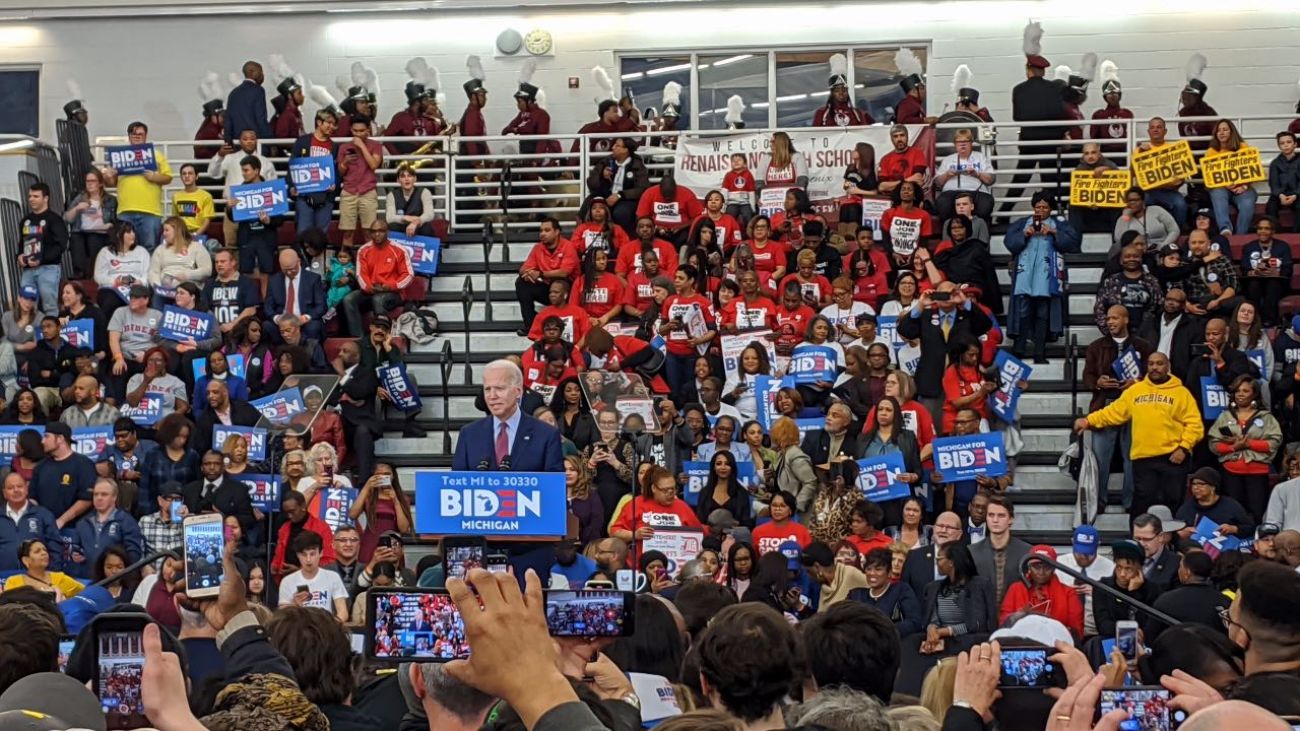Joe Biden wins Michigan Democratic presidential primary

LANSING — Joe Biden won a big victory in the Michigan Democratic primary Tuesday, continuing a remarkable resurgence just weeks after his candidacy was floundering.
The former vice president defeated Bernie Sanders on Tuesday in Michigan’s closely watched Democratic primary, according to projections by the Associated Press, CNN and other major news outlets. President Donald Trump, who is up for re-election, won the state Republican Primary but did not face significant opposition.
As of 9:30 p.m., Biden had opened up a significant lead among Michigan voters and appeared poised to claim a majority of the state’s 125 pledged delegates, who are awarded proportionally based on results across the state and within congressional delegates.
Sanders narrowly won Michigan four years ago over Hillary Clinton and again aggressively targeted the state. He spent five days in Michigan, drawing big crowds to raucous rallies, but was unable to defy polls that showed him trailing by double digits days out from the election.
“Biden had a big, big night tonight,” said Adrian Hemond, a Democratic strategist with the Grassroots Midwest consulting firm in Lansing, “and not just because he won. It appears from all the data we’ve got so far that he performed really well with constituents that Democrats need to perform really well with this fall.”
Biden’s Michigan coalition included African-American voters and college-educated white women, Hemond said, and the former vice president showed some appeal to the kind of white-working class and lower-educated voters who helped propel Trump to the White House.
Biden was propelled by voters like Summer Rose, 53, and her son, Bobby of Diamondale south of Lansing. Both said health care is the most important issue, as both of Summer’s adult children are still on a plan she gets through work at a manufacturing plant that costs $170 per month.
Both liked Sanders’ Medicare for All proposal but opted for Biden for his experience and demeanor.
"I just feel like someone's got to change things,” said Bobby Rose, 22, who works as a school para-professional. “Everyone looks at us like we're a joke, as far as other nations. So we've got to flip that, and I think the best person to do that would be Joe.
Early results and exit interviews suggest Sanders lost ground with white working class and rural voters in Michigan that had backed him four year ago, said Matt Grossman, director of the Institute for Public Policy and Social Research at Michigan State University.
“It appears that might have been more of an anti-Clinton vote,” Grossman said.
While Sanders promised a political revolution to Michigan voters, Biden promised reassurance. He and his high-profile backers, including Gov. Gretchen Whitmer and Detroit Mayor Mike Duggan, touted Biden’s partnership with former President Barack Obama and his role in the 2009 auto industry bailout that helped General Motors and Chrysler avoid collapse.
Biden sent surrogates to Michigan over the weekend, but he did not personally campaign in the state until Monday. He held smaller events in Grand Rapids and Flint before a larger rally at Detroit’s Renaissance High School, where he was joined former primary rivals Sens. Kamala Harris of California and Cory Booker of New Jersey.
Just weeks ago, as he lost a string of early primaries and caucuses before his campaign was revived by winning South Carolina, Biden had very little presence in Michigan at all.
But early results showed Biden dominating Metro Detroit, where he held commanding leads in the state’s three most populous counties. He was outperforming Clinton in Oakland and Macomb counties, and led Wayne County by double digits.
Sanders was unable to replicate a dominant performance in northern Michigan four years ago. And he saw his margins shrink in Kent and Washtenaw counties despite huge weekend rallies in Grand Rapids and Ann Arbor.
Youth turnout helped Sanders top Clinton in 2016, and there were at least some signs of a similar surge this week. University students flooded the Ann Arbor clerk’s office Monday to register to vote or cast absentee ballots. Long lines continued there Tuesday and at clerk’s offices in other college towns, including East Lansing and Kalamazoo.
“That’s what we expected, because as we say in 2018, especially as it gets down to the last 14 days, we see a lot of young people come out and register,” said Michigan Secretary of spokesman Jake Rollow.
A new voter access law changed the dynamics of the Michigan primary. It was the first major contest voters approved a 2018 initiative allowing same-day voter registration, no-reason absentee voting and other options.
As of 4:30 p.m. on Tuesday nearly 7,200 voters had registered to vote on Election Day, up from zero in the 2016 primary. Absentee ballot requests effectively doubled compared to 2016.
Through the end of Monday, 993,814 voters had requested absentee ballots, up 97 percent from four years earlier. More than 800,000 of those ballots had been cast by the end of Monday.
In his events here, Sanders touted plans to create a single-payer health care system, provide free college, eliminate student debt and reshape the economy to fight climate change. He also lambasted Biden over his 1993 on the North American Free Trade Agreement, a pact with Mexico and Canada that Republican President Donald Trump replaced earlier this year.
Biden framed himself as a unifying force capable of bringing Democrats together to defeat Trump in November. Rather than replace private health insurance, he proposed to create a “public option” within the Affordable Care Act, which has helped extend Medicaid access to more than 650,000 Michigan residents.
Exit polls suggested health care was the most important issue to most Michigan voters who cast their ballots Tuesday, and many of them favored creation of a government plan over private insurers. Voters appeared divided over whether the U.S. economic system was in need of a complete overhaul, versus incremental changes or stability.
At a polling place inside Hope Middle School in Holt, Susan and Michael Clark also said health care is top of mind. They pay around $400 per month for health care, and they would "absolutely" benefit if Medicare for All was implemented, Michael Clark, 57, said.
Michael, a sales representative, voted for Sanders — "He's for the working people and I vote strictly for working families because they're getting the shaft."
Susan, a 56-year-old medical biller voted for Biden, saying he's trustworthy person and will fight for progressive causes.
Biden seems to fare especially well with African-American voters and college-educated white women, Hemond said, and showed at least some appeal to the kind of white-working class and lower-educated voters who helped propel Trump to the White House.
“Democrats who are regular primary voters are really concerned about taking back the presidency,” Hemond said. “They also like having a majority in congress, and would like a shot at the U.S. Senate, and I don’t feel like regular Democratic primary voters felt that Bernie Sanders gave them that.”
— Bridge reporter Riley Beggin contributed
See what new members are saying about why they donated to Bridge Michigan:
- “In order for this information to be accurate and unbiased it must be underwritten by its readers, not by special interests.” - Larry S.
- “Not many other media sources report on the topics Bridge does.” - Susan B.
- “Your journalism is outstanding and rare these days.” - Mark S.
If you want to ensure the future of nonpartisan, nonprofit Michigan journalism, please become a member today. You, too, will be asked why you donated and maybe we'll feature your quote next time!




